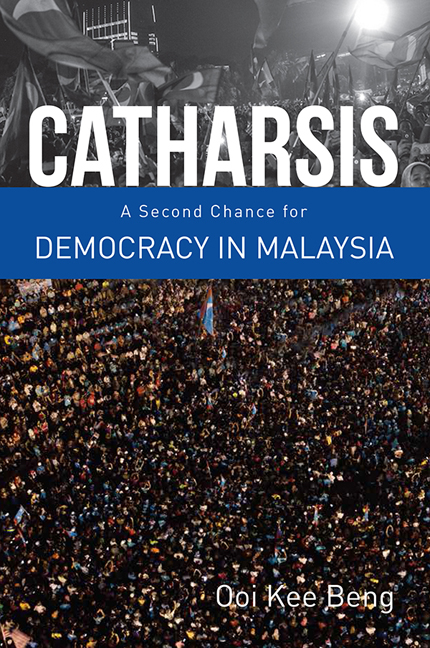Book contents
- Frontmatter
- Contents
- Foreword
- 1 Introduction – Malaysia's Future Is Redeemed
- Before Pakatan Harapan
- 2 After All These Years, Malaysia Is Still Held Hostage
- 3 Beyond the Nationalism Trap
- 4 Federating Malaysia — A Continuous and Troubled Process
- 5 Funeral for a True Son of Penang
- 6 Let's Work Out What Malaysia Is Good For
- 7 The Unity Fetish
- 8 When the National Narrative Loses the Script
- 9 Let's Be Cosmopolitan and Leave Multi-ethnicity Behind
- 10 Noses Don't Grow Back
- 11 Mahathir's Bersatu is Best Understood as an NGO
- Before 9 May 2018
- With Mahathir at the Helm
- Beyond 9 May 2018
- About the Author
9 - Let's Be Cosmopolitan and Leave Multi-ethnicity Behind
from Before Pakatan Harapan
Published online by Cambridge University Press: 12 February 2019
- Frontmatter
- Contents
- Foreword
- 1 Introduction – Malaysia's Future Is Redeemed
- Before Pakatan Harapan
- 2 After All These Years, Malaysia Is Still Held Hostage
- 3 Beyond the Nationalism Trap
- 4 Federating Malaysia — A Continuous and Troubled Process
- 5 Funeral for a True Son of Penang
- 6 Let's Work Out What Malaysia Is Good For
- 7 The Unity Fetish
- 8 When the National Narrative Loses the Script
- 9 Let's Be Cosmopolitan and Leave Multi-ethnicity Behind
- 10 Noses Don't Grow Back
- 11 Mahathir's Bersatu is Best Understood as an NGO
- Before 9 May 2018
- With Mahathir at the Helm
- Beyond 9 May 2018
- About the Author
Summary
It is fascinating how seemingly innocuous words actually are not. Especially those that sound neutral, even ethically positive. That is why the sage never thinks in haste, because he knows the words that bear his thoughts cannot be trusted and his listener's ability to understand him the way he wishes to be understood must always be doubted.
Take ‘multi-ethnic’ for example. We often consider that term to be a practical synonym for ‘pluralism’ or ‘multicultural’. And so, we move on from that concept to begin dreaming about celebrating diversity based on multi-ethnicity. And we are then exasperated by how impossible that seems to be.
I suspect the basic problem is that ‘multi-ethnic’ is actually a highly conservative term. Its major connotations are static and ignore the evolving nature of individual identities in favour of collectivising humans under simple groupings.
Revealingly, after the term ‘race’ became taboo in social scientific circles following the end of the Second World War, ‘ethnicity’ was recruited instead to replace it. In Malaysia, we now use those two as synonyms, as we do with ‘multi-racial’ and ‘multi-ethnic’.
Putting together disparate units that are in the process starkly distinguished from each other does not bode well for the harmony of the whole. There is a contradiction herein that should warn us to have low expectations. The association between the groups is encouraged to be cultural or religious and is about treating each other as members and representatives of distinct groups. This collective identity approach to social life is a defensive and conflict-oriented one that cannot but breed caution and fear rather than celebration and enjoyment. If you ask me, that is where racism has its roots.
The future is urban
There is also the aspect of existential space. If we assume rurality as the backdrop for modern social interactions, then we are assuming that there is sufficient space for problematic differences to exist at a safe distance from each other. On the other hand, if we assume urbanity instead as the present and definitely the future nature of Malaysian society, then we must deal with the fact that there is simply not enough existential space for static divisions to be able to co-exist harmoniously.
- Type
- Chapter
- Information
- CatharsisA Second Chance for Democracy in Malaysia, pp. 32 - 33Publisher: ISEAS–Yusof Ishak InstitutePrint publication year: 2018



